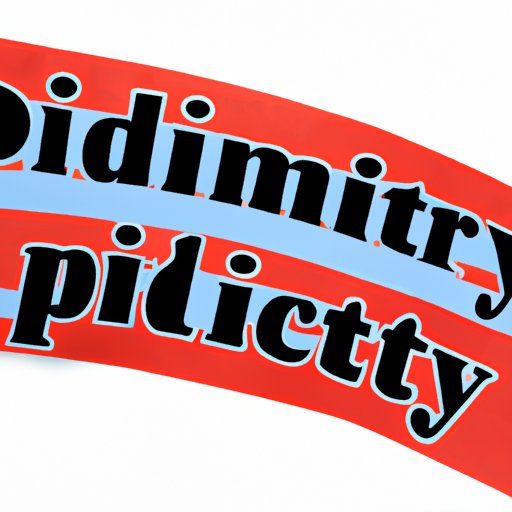Introduction
Many people struggle with identifying their political beliefs and affiliations. With so many complex issues and conflicting information, it can be challenging to know where you stand. In this article, we will explore ways to determine which political party aligns with your beliefs and values. This guide is intended for anyone who wants to better understand their political identity and make informed decisions.
How to Determine Which Political Party Aligns with Your Beliefs and Values
The first step in determining your political identity is to consider your own beliefs and values. Ask yourself what issues are most important to you and what values you prioritize. It might be helpful to create a list of common political issues and reflect on where you stand on each one. This can include issues such as abortion, gun control, taxes, healthcare, immigration, and foreign affairs.
After reflecting on these issues, you can create a list of your top political priorities. Understanding your priorities can help guide your political decisions and make it easier to identify a party that aligns with your beliefs.
Unveiling the Differences Between Republicans and Democrats: Which Party Reflects Your Ideology?
The two major political parties in the United States are the Democratic Party and the Republican Party. While each party has a unique set of beliefs and values, it’s important to note that individuals may hold a mix of views from each party.
Democrats tend to prioritize issues such as social justice, environmental protection, and government regulation. They are often in favor of taxes on the wealthy, universal healthcare, and strong action on climate change.
Republicans, on the other hand, tend to prioritize issues such as limited government, national security, and individual freedom. They are often in favor of lower taxes, free-market capitalism, and strong borders.
To determine which party aligns with your ideology, it’s important to break down the parties’ positions on various issues. Some of the issues to consider include:
- Taxes and government spending
- Healthcare and social welfare programs
- Immigration and border control
- Environmental protection and climate change
- Foreign policy and national security
It’s also important to note that party platforms may change over time and that individuals may have differing opinions within their party. Therefore, it’s important to stay informed and engaged on issues that matter to you and continue to refine your beliefs.
Taking a Nonpartisan Approach: A Guide to Finding Your Political Identity
While it’s important to understand the beliefs and values of different political parties, it’s also possible to have political beliefs that do not align with one specific party. In fact, taking a nonpartisan approach can allow you to consider a wider range of perspectives and make more informed decisions.
One way to take a nonpartisan approach is to seek out a variety of news sources and opinion pieces. While it may be tempting to only read sources that reinforce your existing beliefs, it’s important to stay informed on a variety of perspectives.
Another way to take a nonpartisan approach is to engage in respectful political discussions with others. This can help you refine your beliefs and better understand the perspectives of others.
The Importance of Understanding Your Political Affiliation: A Story of a Former Undecided Voter
Understanding your political identity can have a significant impact on your future political engagement. Without a clear understanding of your beliefs and values, it can be difficult to make informed decisions or participate in political discussions.
For example, consider the story of John, a former undecided voter. John had a vague sense of his political beliefs but was not sure which party aligned with his values. He often sat out of political discussions and felt disconnected from the political process.
After doing some reflection and research, John realized that he held values that aligned with the Democratic Party. This newfound understanding allowed him to engage more fully in political discussions and make informed decisions in elections. He also became involved in local political organizations and felt empowered to make a difference in his community.
Exploring the Influence of Social, Economic, and Environmental Issues on Your Political Views
It’s important to consider how your social, economic, and environmental surroundings impact your political beliefs. Real-world issues such as income inequality, climate change, and discrimination can have a significant impact on our political views.
For example, someone who has experienced discrimination based on their race or sexual orientation may have a heightened awareness of social justice issues. Someone living in an area with poor air quality may prioritize environmental protection.
By understanding how these issues impact our political views, we can be more informed and engaged in the political process.
Conclusion
Determining your political identity can be a challenging but important process. By reflecting on your beliefs and values, understanding the beliefs and values of different political parties, taking a nonpartisan approach, and considering the impact of social, economic, and environmental issues, you can better understand your political identity. Remember to stay informed and engaged in the political process as you continue to refine your beliefs and make informed decisions.
